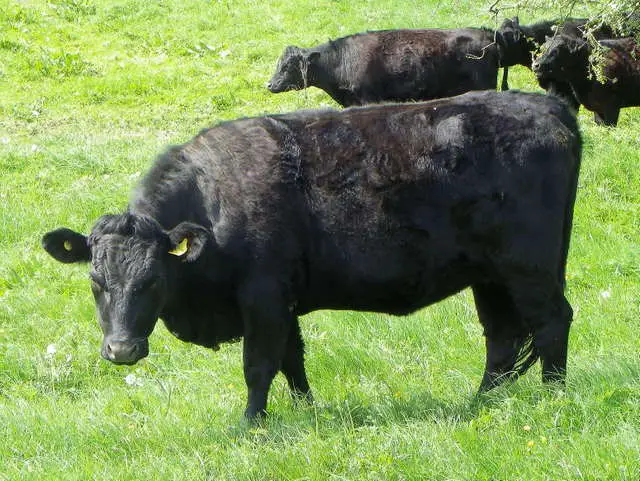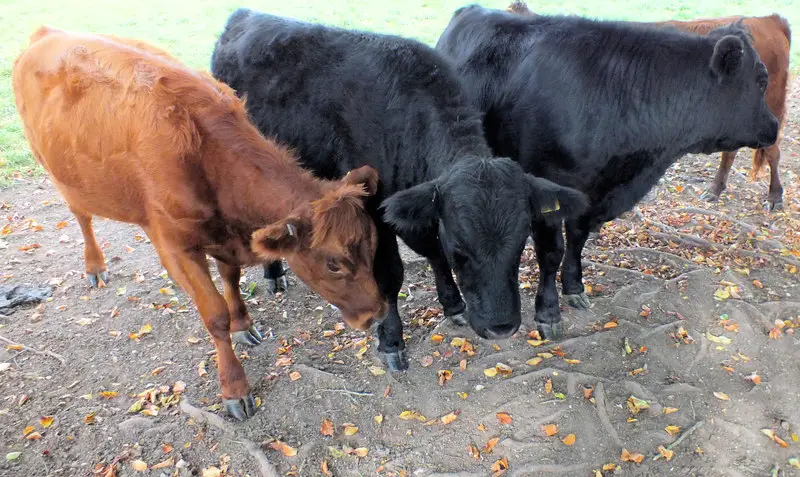
Dexter Cattle! If you’re looking for a smaller-sized cattle breed that packs a big punch in terms of versatility and personality, then it’s time to meet the Dexter! These compact cattle hail from Ireland and are known for their hardiness, adaptability, and surprising dual-purpose abilities. Whether you have a small farm, a homestead, or just a deep curiosity about cattle breeds, the Dexter has plenty to offer.
Origin
The Dexter’s story begins in the rugged landscapes of Southwestern Ireland. It’s believed they are descended from ancient Celtic cattle. Historically, these were considered the “poor man’s cow,” valued by smallholders as they offered both milk and beef within their smaller package. Their hardiness and ability to thrive in less-than-ideal conditions made them ideal for this role.
Characteristics
Dexters are one of the smallest cattle breeds in the world. Mature cows typically weigh 600-700 pounds, while bulls reach around 1000 pounds. Despite their size, they are sturdy and well-proportioned. Dexters can sport solid black, red, or dun-colored coats. One of their attractive features is that they can be both horned or polled (naturally hornless). They are known for their easy-going temperaments and adaptability. These cattle can handle diverse climates and terrains with aplomb.

Advantages And Disadvantages Of Dexter Cattle
Advantages
Let’s delve into the reasons why you might consider Dexter cattle:
- Dual-Purpose Powerhouse: Dexters are a true multi-tasker! They produce good quality beef and surprisingly rich milk (ideal for butter and cheese) from their smaller frames.
- Feed Efficiency Champs: Their smaller size and efficient metabolism mean Dexters make the most of available pasture. They’re masters at thriving on less-than-perfect forage.
- Homesteader’s Friend: If you have a smaller property, Dexters fit the bill. They are easy to handle and less intimidating for those new to working with cattle.
- Adaptable and Hardy: From heat to rough terrain, Dexter cattle have a reputation for toughness and resilience.
Disadvantages
For a balanced view, let’s consider some potential downsides:
- Smaller Yields: While delicious, a Dexter won’t produce the same volume of beef or milk as specialized commercial breeds. This is the trade-off for their compact size and efficiency.
- A Touch of Independence: Dexter cattle have retained some survival instincts from their hardier past. While generally docile, they might occasionally exhibit a streak of independence.

Characteristics Table
| Characteristic | Description |
|---|---|
| Color | Black, red, or dun |
| Heat Tolerance | Moderate |
| Average Weight (mature) | Bulls: 700-1,000 lbs (317-453 kg), Cows: 600-750 lbs (272-340 kg) |
| Size | Smallest British cattle breed |
| Temperament | Docile, friendly |
| Maternal Traits | Excellent mothers, easy calving |
| Milk Production | Good for their size (2-3 gallons per day) |
| Beef Production | Good quality beef, fine-grained, well-marbled |
| Other Notable Traits | Dual-purpose breed (milk and beef), efficient grazers, adaptable to various climates |
Irish Dexter Cattle
While “Dexter cattle” is the common name, it’s worth noting that the official breed name is “Irish Dexter.” This emphasizes their origin and heritage.
Dexter Cattle Meat
Dexter cattle are known for producing flavorful and well-marbled beef. This marbling contributes to exceptional tenderness and juiciness. They work well with both grass-fed and grain-finished production models.
FAQ
What are Dexter cows good for?
Dexters are ideal for smaller farms, homesteads, and those seeking a dual-purpose (beef and milk) breed.
What are the disadvantages of Dexter cattle?
Their smaller size means lower total yield (both in milk and beef) compared to larger, specialized breeds.
Are Dexter good milk cows?
While they don’t produce the volume of a dairy breed, Dexters offer milk with high butterfat content, perfect for cheese and butter making.
How much meat is in a Dexter cow?
A mature Dexter steer would typically yield around 50%-55% of its live weight in dressed beef.
Do Dexter cows produce milk?
Yes! Dexter cows do produce milk, though in smaller quantities than specialized dairy breeds.
How long do Dexter cows live?
Dexter cattle are known for their longevity, often living 14+ years compared to shorter lifespans of some larger breeds.

Conclusion
If you’re seeking a versatile, hardy, and surprisingly productive small cattle breed, the Dexter cattle deserve a closer look. Their ability to thrive on less, combined with flavorful beef and rich milk, make them a true gem. While they may not be the biggest producers, they more than make up for it with efficiency, hardiness, and a unique charm that’s sure to win your heart.
Have you ever worked with Dexter cattle? Share your experiences or any questions you have in the comments below!
